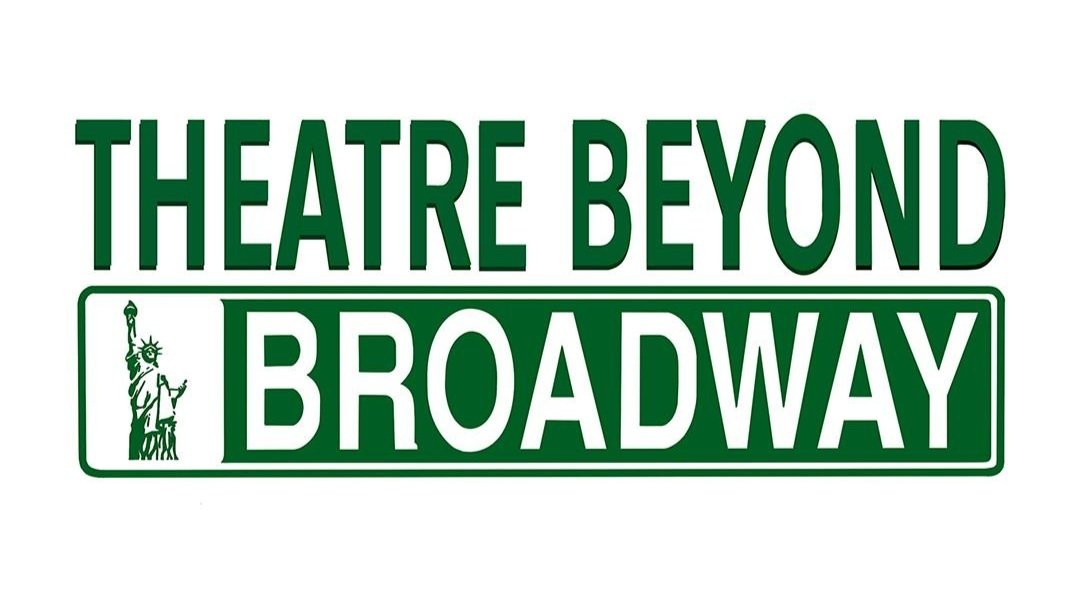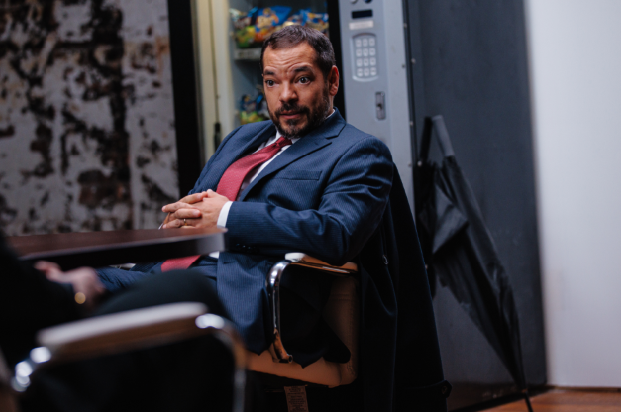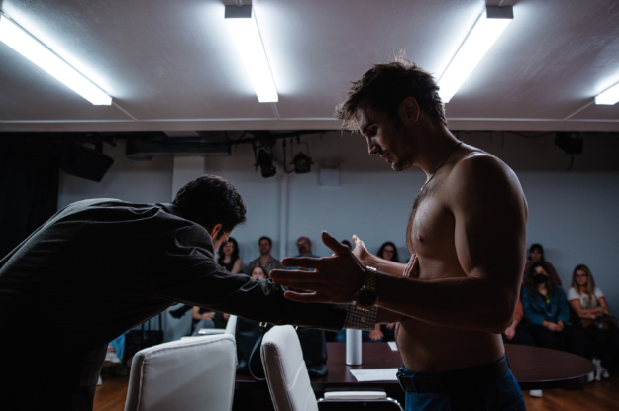BULL
Written by Mike Bartlett; Directed byMax Hunter
JACK | 20 Putnam Ave, Brooklyn, NY 11238
September 19 - October 4
Photo Credit: Marc J. Franklin
BULL, Mike Bartlett’s compact, ferocious little fable of office Darwinism returns, revived in a production so tightly coiled and so suffocatingly intimate that it practically wheezes with tension. Mounted by the Bridge Production Group at JACK and directed with scalpel-sharp precision by Max Hunter, this staging thrusts us not merely into a conference room, but into the psychological meat grinder that passes for corporate “team culture” in times of economic contraction.
From the moment you enter the space—a narrow, sterile white box of a set designed with unnerving realism by Thomas Jenkeleit—you’re already on edge. The conference room, flanked by audience members on two sides, is decked out with the banal detritus of contemporary white-collar life: a flickering fluorescent ceiling, courtesy of Cheyenne Sykes’ exacting lighting design, a cheerily useless motivational poster, a vending machine long since given up on the American Dream, and a locked cabinet of office supplies standing sentry like some bureaucratic reliquary. The set is so faithful it feels less like design and more like excavation. You don’t watch this play—you inhabit it. Or perhaps, more accurately, it traps you.
And you might find yourself flashing back, with a cold shudder, to every “check-in” or “performance review” you’ve ever suffered through. Because this is no ordinary meeting. It is a ritual sacrifice, held under the flickering lights of late capitalism.
The plot is brutal in its simplicity: an unnamed corporation is reducing its workforce by a third. Three employees are called into a conference room. Two will survive. One will not. It’s Survivor: Office Edition, but with none of the glamour and all of the despair. And here, the outcome is never in doubt.
Whether this inevitability is a flaw or the genius of Bartlett’s script is up for debate—but there is no suspense in the traditional sense. We know who the sacrificial lamb is from the moment the trio enters: Tony, the smug team leader with his athleisure bravado and smug superiority (played with slippery ease by Alexander Pobutsky); Isobel, sleek and surgically composed in her French twist and weaponized civility (Kerstin Anderson, whose every icy line lands with the precision of a letter opener); and then poor Thomas, played by Miles G. Jackson with heartbreaking physical unease, his every twitch a semaphore of social failure.
Thomas—his suit too big, his affect too small—is the kind of man who believes the Post-it note on a vending machine dictates his fate. And in this production, it does. Jackson is astonishing: every blink and breath maps the slow erosion of a man who began the play clinging to the illusion of fairness and ends it stripped of even that.
Bartlett’s dialogue is clinical in its construction, a dissection performed in real time. Isobel and Tony slice into Thomas not with outright violence (at first), but with insinuation, condescension, and the banal cruelty of the competent co-conspirator. They are polished predators, and their cruelty is cumulative: a forgotten message here, a snide jab there, each word carefully placed to loosen Thomas’s grip on his own sense of worth. It is funny—until it’s not.
Indeed, there’s a queasy, horrible laughter that ripples through the audience early on, as Thomas stammers and flails and attempts to assert some version of himself. But that laughter curdles, slowly but unmistakably, as Isobel and Tony ramp up the gaslighting, eroding his dignity until the final act of corporate hazing is so vicious, so gratuitous, that you can feel the audience pulling back in horror. And yet no one looks away.
Hunter’s direction is immaculate—he trusts the script’s slow burn, guiding his cast through a steady escalation from office banter to psychological torment. The final entrance of Mr. Carter (Paco Tolson), the boss who delivers the fatal blow, should offer a break in tension. Instead, Tolson’s bone-dry, performatively “honest” manager only deepens the cruelty. His blunt corporate-speak is the final insult: no empathy, no ceremony, just transactional brutality disguised as transparency.
And let’s talk about costumes. Amanda Roberge’s choices are exquisite in their subtleties. Tony’s athleisure gear says “alpha male on the go” while whispering “this guy hasn’t seen a gym in months.” Isobel’s sleek tote and impeccable hair tell you she’s never had to run for a train in heels. And Thomas? His suit is an entire character study: hopeful, wrong-sized, and thoroughly defeated by its wearer. You don’t see the lapel stain until someone maliciously points it out. These people are costumed not for theater, but for combat.
If BULL has a flaw, it is the nagging emptiness it leaves behind. There is no catharsis, no revolution, not even much in the way of reflection. It ends as it begins: with Thomas crushed and the others walking away, untouched and untroubled. The system wins. Again.
Isobel reveals herself to be a master tactician of emotional warfare—but what is most chilling, most viscerally unsettling, is the sheer ease with which she crosses the final line. Tony exits and she stays behind. In a moment that lands like a slap to both Thomas and the audience, she dispenses with all pretense of professional decorum and descends into a moment of gratuitous physical violence—not out of necessity, not even out of passion, but as an assertion of absolute dominance.
And yet, even this act of corporeal cruelty is not the climax of her malice. No, the true coup de grâce comes after, when the metaphorical knife she has long been brandishing is not simply driven into Thomas’s proverbial back, but twisted—slowly, surgically, and with a terrifying calm. The job is already hers. The war has been decisively won. But Isobel cannot resist the final flourish, the gratuitous rhetorical execution that serves no purpose but to annihilate what remains of Thomas’s spirit. It is victory devoid of grace, a triumph rendered monstrous by its lack of necessity. In that moment, Isobel is no longer just a corporate survivor—she is the embodiment of institutionalized cruelty, weaponized charm, and unchecked power in stiletto heels that look more like razor blades.
Bartlett’s brilliance lies in denying us satisfaction. In showing us a corporate slaughterhouse so unrelenting, so true to life, that we leave not with hope, but with recognition. We’ve seen this play before. Not on stage—but in our own lives, in open-plan offices and Zoom calls and HR-speak emails offering “support during this difficult time.”
Twelve years after its premiere, BULL feels no less urgent—and in this production, perhaps more so. The British economic landscape it once skewered has metastasized across the Atlantic. The American workplace is now just as callous, just as performatively “efficient,” just as brutal in its ritual humiliations. This is theater as vivisection: cold, precise, devastating…and utterly unmissable.
Click HERE for tickets.
Review by Tony Marinelli.
Published by Theatre Beyond Broadway on September 25, 2025. All rights reserved.







